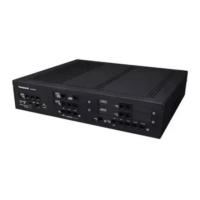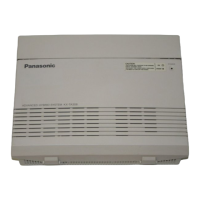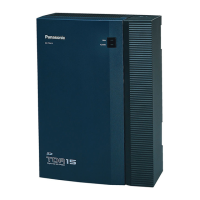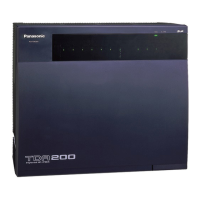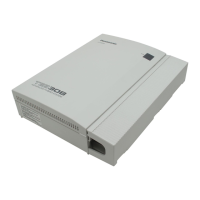1.30 Networking Features
1.30.1 TIE Line Service
Description
A TIE line is a privately leased communication line between two or more PBXs, which provides cost effective
communications between
company members at different locations. The TIE lines can be used to call through
the PBX to reach another switching system (PBX or telephone company). By using TIE lines, the PBX can
support not only communications with the public network but with other company members in the private
network where the PBX is included.
Interface
The following interfaces can be used to establish a private network:
Interface Network Type
E & M Analogue
T1 (TIE [E & M])
Digital (64 kbps ´ 24 channels)
E1 (E & M)
Digital (64 kbps ´ 30 channels)
BRI/PRI (QSIG) Digital (ISDN 2B+D/30B+D/23B+D)
VoIP Internet Protocol (IP)
The available interfaces depend on the cards installed in the PBX.
® 3.33 [1-1] Slot—Port Property - BRI Port—Network Numbering Plan—
Trunk Property
® 3.35 [1-1] Slot—Port Property - PRI Port—Network Numbering Plan— Trunk Property
® 3.38 [1-1] Slot—Port Property - T1 Port—
Trunk Property
® 3.44 [1-1] Slot—Port Property - E1 Port— Trunk Property
® 3.47 [1-1] Slot—Port Property - EM Port— Trunk Property
Feature Guide References
1.1.1.6 Intercept Routing
1.3.1.2 Call Forwarding (FWD)
1.9.1 Toll Restriction (TRS)/Call Barring (Barring)
1.10.1 Automatic Route Selection (ARS)
1.12.1 Call Transfer
1.17.6 Direct Inward System Access (DISA)
2.3.6 Flexible Numbering/Fixed Numbering
3.1 Capacity of System Resources
User Manual References
1.2.1 Basic Calling
Feature Guide 323
1.30.1 TIE Line Service

